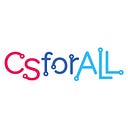Original article posted August 7, 2020 on,‘Education, The Keyword, Google’.
Each morning at 9:30 a.m, Makayla Davis of Aberdeen, Mississippi logs on to start her day. Instead of simply watching TV, hanging out or getting roped into yard work, Makayla is learning cryptography, network fundamentals and penetration testing techniques.
She is one of 24 Air Force Junior ROTC cadets from 12 states participating in the inaugural Air Force JROTC Cyber Academy, an eight-week virtual course that will earn each cadet three college credits and prepare them for valuable industry certifications. She started the program when one of her teachers told her about the opportunity. “I was excited to learn new things that I could bring back to my school,” she says.
The course is part of the JROTC-CS Demonstration Project, a collaboration between the Air Force JROTC and CSforALL, aimed at growing the talent pipeline in critical technology careers. The project is funded through an advisory consortium of nonprofits, federal agencies and corporate sponsors, including Google. Google supports CSforALL, in addition to other organizations such as 4-H, Kapor Center and the Computer Science Teachers’ Association to ensure that all students, regardless of background, have equitable access to computer science learning opportunities.
The Air Force JROTC serves more than 125,000 cadets at nearly 900 high schools across the U.S. and overseas, but only 36 percent of those schools offer an AP computer science course. JROTC-CS aims to develop a way to increase computer science and cybersecurity programs at all JROTC high schools, and offer opportunities for cadets to develop skills, explore technical career paths and earn industry certifications, scholarships and more.
“This program embodies the AFJROTC mission: developing young citizens,” says Colonel Stephen T. Sanders, Director, HQ AFJROTC. “Whether our cadets have military or civilian careers in mind, we are preparing them for the future.”
The AFJROTC Cyber Academy is offered through Mississippi State University and was intended to be an on-campus experience. Due to the COVID-19 pandemic, the program went virtual and the cadets, instructors and mentors are logging in from all over the country. The team includes instructors and mentors from Mississippi State, the National Cybersecurity Training and Education Center (NCyTE) at Whatcom Community College in Washington State and Moraine Valley Community College in Illinois.
Like everyone working or learning from home, the pivot to virtual created some challenges for the JROTC cadets. CSforALL raised funds to make sure all students had devices to participate virtually. In week six, the cadets have broken into project teams to research security challenges and share recommendations back to the group. Makayla’s team is exploring the use of deterrents, which are ways to prevent people from entering a site. She is excited at the prospect of developing a cybersecurity plan for her school, where she’ll be a “cybersecurity ambassador” when she returns.
Makayla and her fellow cadets have plans that go way beyond high school, though. “I’m thinking about how to combine cybersecurity with psychology for my future career,” she says.
About the Author: Ruthe Farmer, Chief Evangelist at CSforALL, is a national advocate for gender equity and diversity in technology, and has focused her efforts on diversity in technology and engineering since 2001. At CSforALL, she serves as Chief Evangelist, working to invite new stakeholders to the CSforALL table — and make the table bigger. Prior to joining CSforALL, Ruthe served as Senior Policy Advisor for Tech Inclusion at the White House Office of Science & Technology Policy focusing on President Obama’s call to action for Computer Science for All, led strategy and K-12 programs at the National Center for Women & Information Technology (NCWIT), and implemented national tech and engineering programs at Girl Scouts of the USA. She has launched multiple national inclusion programs including Aspirations in Computing, TECHNOLOchicas, the AspireIT outreach program, Lego Robotics for Girl Scouts, Intel Design & Discovery and more. She served as 2012 Chair of CSEDWeek, was named a White House Champion of Change for Technology Inclusion in 2013, received the Anita Borg Institute Award for Social Impact in 2014, and the UK Alumni Award for Social Impact in 2015. Ruthe holds a BA from Lewis & Clark College and an MBA in Social Entrepreneurship from the University of Oxford.
About JROTC-CS Demonstration Project: CSforALL has collaborated with the US Air Force JROTC HQ and additional partners to launch JROTC-CS, a demonstration project to design and test implementation models for the long-term scale-up of evidence-based computer science (CS) and cybersecurity education programs for students in the Junior Reserve Officers Training Corps (JROTC). This project supports the goals of the JROTC Cyber Training Act of 2019 (H.R. 3266 and Senate 2154) and is in alignment with Section 512 of the 2020 National Defense Authorization Act, which amended Section 2031(b)(3) of title 10, United States Code, to include instruction or activities in the fields of science, technology, engineering, and mathematics in the JROTC program. At scale, this project has the potential to engage over 500K high school students in computer science and cybersecurity education pathways, as well as build technology education capacity at over 3400 JROTC high schools, serving 4M students overall.
